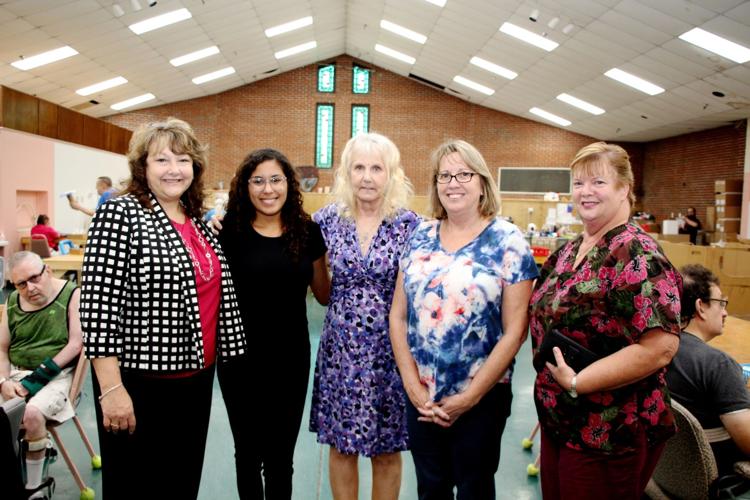
(Photo credit: )
Melissa Walker (KTC Executive Director), Heidi Gutierrez (Development and Community Relations Manager), Sara Roberts (Director of Residential Services), Shirl Elder (Vocational Services Supervisor – Inverness ADT), Sue Manfredi (Nursing Supervisor).
Key Training Center — Healthcare Humanitarian Award
For 52 years the Key Training Center, this year’s Healthcare Humanitarian Award winner, has been solely focused on improving the lives of developmentally disabled adults. They have accomplished this by providing an array of services that promote growth, choice, and independence in their clients and with the loving support of the entire community.
The Key started in 1966 with a small state grant and community contributions. They built a workshop on land in Lecanto to train seven clients. Today, it serves 300 individuals.
“We’ve done that with the assistance of the community,” said Melissa Walker, Key Training Center executive director. “The community is such a strong support base for us. People understand our services and the great need for them.”
From their original 40-acre property in Lecanto and a new Inverness campus, the Key provides adult day training and work sites for clients. It also operates 20 group homes and four apartment complexes throughout the county, which house 150 clients (other clients live with family or independently).
Sarah Roberts has worked for the Key Center for 37 years, the last 10 as director of residential services. She has been part of the tremendous growth of the Key’s residential programs.
“I just fell in love with Citrus County,” she said. “I could see the love the community had for the residents — they were welcomed and cherished. It’s been a real joy to be part of the Key. I get such enjoyment out of seeing our clients grow, improve and develop. They love what they do.
Each Key client starts out with a support plan — designed with input from the client, a Key representative and parents or guardians, said Walker. The system is designed to help the individual live as independently as they can. The plan includes goals they want to work on and is reviewed regularly.
“Clients work and learn in adult day training based on their individualized plan. Some might work on math, computer, cooking, or money skills,” she said.
Work is a big component of the Key’s philosophy. From two large rooms on the campuses, Key Center clients do assembly work for Closet Maid and smaller contractors. Others work in the Center’s nursery or with the landscaping crew, maintaining Key Center properties and other properties in the county. Clients also work in the Key Center Thrift Stores. Local businesses also employee Key Center clients, who often work with the help of a job coach.
Shirl Elder, vocational services director, has assisted and supervised clients in the work center for 27 years.
“This is the happiest place to work,” she said, as she gazed across the large space filled with dozens of Key clients busy at their assembly jobs. “The clients enjoy the challenges and like to be kept busy.”
“We tried to set up a senior program so that our older clients could get together and watch TV or play games,” said Walker. “They hated it. They just wanted to go back to work.”
The Key Center has earned such a reputation for success that, for decades, families have moved to Citrus County just for its services. That list includes the late Chet Cole, the Key Center’s longtime director and visionary, whose family moved to the area to get support for his sister. Cole became the Key’s director in 1971. He died in April 2017.
Sue Manfredi, RN, director of nursing for the Key, came from Pinellas County for her developmentally disabled son, Michael, who was 21 when they arrived. Michael started out with the landscaping crew but wanted to try hospital volunteering. He joined Citrus Memorial Hospital, first as a volunteer, and then got hired. For the past 10 years, he has been a part-time environmental services employee at CMH.
“He loves to work so much that he hates to take a day off when he’s sick,” said Manfredi. “It shows me that the Key helps people who can get out and work. For those who can’t, we have the programs here.”
With the average age of a Key client now 55, the center focuses even more on health needs. People with Down’s syndrome are more prone to dementia and Alzheimer’s disease.
“People with developmental disabilities are living longer and better because they get better care,” said Manfredi, noting that some of their clients have lived into their 90s. “But as problems like dementia develop, we’re here to provide long-term care in their homes.”
The Key gets 60 percent of its funding through Medicaid reimbursements. Another 30 percent comes from revenue from the thrift shops. Community support, such as the annual Run for the Money, provides scholarships for clients, some of whom are wait-listed for more than 10 years to get Medicaid coverage for the placement.
“There are 60 providers like the Key in Florida. Many are closing their doors or reducing services,” said Walker. “Providing scholarships for clients is unheard of, except here. That’s what the community does for us.”
Each woman believes that the community, the staff, and the clients together make the Key Training Center a special place to work.
“There aren’t too many jobs where you can get hugs on a daily basis,” said Elder.
“The staff has such love for our clients and we get it right back,” added Roberts.
“The joy you get when a client smiles at you,” said Manfredi. “I’ve not found anything like the Key.”
“You’re making a difference in peoples’ lives,” said Walker. “The goal here is not the bottom dollar, it’s the relationships you build. The clients are in our hearts.”
AS FEATURED ON: https://www.chronicleonline.com/contests/healthcareheroes/chet-cole—key-training-center/article_4f874c3a-a54f-11e8-b194-cb798799f8c5.html
